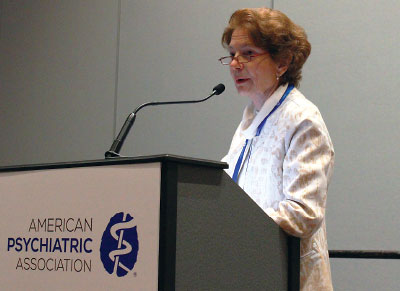‘We Are Seeing Change’: AWP Looks Back on 40 Years of Social Justice
Abstract
In honor of the 40th anniversary of the Association of Women Psychiatrists, several women trailblazers reflected on the history of women in psychiatry and discussed where work is still needed.
Christina Khan, M.D., Ph.D., began her presentation at APA’s 2023 Annual Meeting by asking her audience a series of questions. How long has APA been in existence? Since 1844, members of the audience responded. When did APA have its first woman president? Not until 1985, a few people answered at once.
“It took 141 years for APA to have its first female president, but there have been six female presidents in the past 10 years,” Khan said. “We are seeing change.” Carol Nadelson, M.D., was APA’s first woman president.

Silvia Olarte, M.D., spoke at APA’s 2023 Annual Meeting during a session celebrating the Association of Women Psychiatrists’ 40th anniversary. She pointed out the need to continue encouraging women to seek leadership positions within psychiatry.
Khan is the president of the Association of Women Psychiatrists (AWP), which this year is celebrating its 40th anniversary. During a panel discussion, Khan was joined by distinguished figures in the histories of both AWP and APA, including Nadelson, past APA and AWP President Altha Stewart, M.D., past APA President Nada Stotland, M.D., M.P.H., and past AWP President Silvia Olarte, M.D.
“These women have not only been mentors to many of us, but they have also really changed the landscape of psychiatry here in the U.S. and around the world,” Khan said.
Leslie Gise, M.D., gave some remarks about the founding of AWP in 1983 by Alexandra Symonds, M.D., who was also AWP’s first president. All the panelists were past recipients of the Alexandra Symonds Award, which honors a woman psychiatrist who has made significant contributions to promoting women’s health and the advancement of women. The award is co-sponsored by the AWP and APA’s Caucus of Women Psychiatrists.
The panelists spoke about their experiences as women leaders in psychiatry, as well as historical and ongoing social justice efforts. Olarte emphasized the challenges women have experienced and how hard they had to push to elect the first woman president. She also noted the importance of AWP, in that it allowed women psychiatrists a voice outside of APA. There have been 14 women presidents of APA. “But I don’t think 14 is enough,” Olarte said.
“Women have always been in medicine, even just a few,” Nadelson said. “But they were never included in [medical] organizations.” Throughout her career, and especially in the early stages of medical school and residency, Nadelson was often the only woman among her peers. She noted the importance of mentors, including male mentors who are supportive of women in medicine, in helping women like herself succeed.
Stotland spoke about APA and AWP’s roles in supporting reproductive rights for women. APA has had very strong positions on abortion for many years, she said, and she urged psychiatrists to use their expertise on the psychological aspects of abortion to educate the public. “This is a hot topic in our country, but you do not hear our expertise being reflected in the public sector,” she said.
She shared her experiences advocating for reproductive rights, including testifying to Congress. She was the chair of the Committee on Women when APA was asked to give testimony to C. Everett Koop, M.D., who served as surgeon general under President Ronald Reagan. Koop, who was anti-abortion, was tasked with completing a report on the impact of abortion on women. Stotland reviewed the literature and provided oral and written testimony to Koop, explaining that there is no evidence that abortion negatively impacts women’s mental health. Ultimately, Koop refused to write the report, concluding that the impact of abortion on women in America, from a public health perspective, is miniscule.
Stewart spoke about her experience as APA’s first Black president. She pointed to a Toni Morrison quote that has helped her in extending her identity, style, and personality into her leadership at APA: “I stood at the border, stood at the edge, and claimed it as central. l claimed it as central and let the rest of the world move over to where I was.”
“This is the philosophy that helps to propel me to keep working in ways that will influence our field and improve the way our younger colleagues—particularly young women colleagues—enter and feel that they can be sustained in our field,” Stewart said. “I think we really do have to consider a different model than the one that has always been in place.” ■



